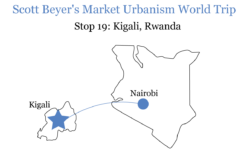Central Africa’s Singapore
Rwanda - namely its capital city Kigali - shows another case of the upsides versus downsides of authoritarian rule.
80 years ago, Singapore was a small colonial city in Southeast Asia with poverty at levels seen elsewhere in the Third World. Since then it’s become an economic powerhouse, with one of the world’s highest per capita GDPs. It did this under Lee Kuan Yew, an autocrat who embraced growth and markets but also government planning and staunch behavioral codes. Since then a debate has raged – embodied today in the China vs. U.S. contrast – about whether societal wealth is built through top-down managerial statism or decentralized democracy.
Now Africa is adding to that debate.
Rwanda, three decades post-genocide, has become a rising nation. GDP per capita has nearly 8x’d while annual growth rates are often above 5%. It has formed a pro-business reputation, with relatively less taxes, regulations and corruption. Rwanda is ranked 38th in ease of doing business, not far behind Switzerland and Israel and well above any mainland African country. It has worked to allow more foreign direct investment, including legal changes that let foreigners buy land, in contrast to the more isolationist African countries.

Rwanda achieved this through autocratic, not democratic, means. Following the 1994 Hutu-vs-Tutsi tribal conflict that killed over 500,000, military leader Paul Kagame rose to power and has remained president since. He rules Rwanda with principles similar to those of Yew. Rwanda cracks down on inflammatory speech and tribal identification (since those helped spark the genocide), but also embraces economic growth, infrastructure and modernization.
Kigali – sometimes called “the Singapore of Africa” – testifies to this governing philosophy. The Rwandan capital has become the focus of national investment, with the country leaning into its organic rural-to-urban migration rather than promoting the polycentrism fad found elsewhere in Africa.
This state-led focus has, as I found when visiting in March, made Kigali a clean, orderly, verdant city. Its public right-of-way, lined with trees and flowers, is perhaps the best-managed I’ve seen of any big city, 1st or 3rd World. The mass transport system is also excellent, albeit through a contrarian route; rather than flooding the city with loud, expensive trains and buses, it has a regulated shared motorbike taxi system that’s easy to hail in under 2 minutes (see my earlier profile). Kigali has big new buildings but is also modernizing its slums. The Kigali Innovation City project is a public-private special jurisdiction tech hub that has already attracted a Carnegie Mellon satellite campus.
Rwanda’s governing competency surfaced in small ways, too. Kigali is full of neighborhood “milk zones” that, in a public health initiative, sell subsidized local milk to residents. They sell the sweetest, creamiest milk I’ve tasted. While drone delivery continues to hit regulatory snags in the U.S., Zipline drones are delivering medical products across Rwanda.
There are several ways to contextualize this success. Rwanda got flooded with foreign aid following the genocide, and still enjoys a strong philanthropic and NGO presence. Rwanda also has a fortunate location, as a small, dense country that sits within busy flight paths and trade routes. Post-genocide, there are no longer deep religious or tribal conflicts.
But one cannot overlook the role that autocratic leadership plays, especially of the “informed” kind practiced by Kagame. When a country is ruled by a strongman, people don’t act out. Rwanda has by far the lowest crime index of 23 African countries ranked by Statista; its streets were refreshingly clear of the mafioso behavior I’ve come to expect from other big African cities. Economic development projects get rammed through by the Rwanda Development Board, a one-stop bureaucracy, rather than held up by neighborhood opposition.
But there are downsides to one man having such power. Kagame routinely wins over 95% of the vote in reelections that human rights organizations have called illegitimate. He has cracked down on journalists and political opponents. It was interesting while staying in Kigali to note the difference in how Americans and Rwandans talk about politics. Every morning over breakfast I would scroll Facebook to find my U.S. friends doing their usual mudslinging on Trump or Biden. But Rwandan locals shied away from such dialogue, instead referring to Kagame as “his excellency.”
There are still lessons that Americans can glean from such autocratic governance. Such countries – whether they’re rich like Singapore, poor like Rwanda, or in-between like China – achieve certain efficiencies from top-down management, be it bullet trains, large real estate developments, or well-planned cities. Autocracy can even enhance personal rights by leaving them less subject to the whims of democratic majorities. But as Kagame’s regime shows, what the autocrat giveth, he taketh away. An efficient city may be of little comfort to someone if they cannot complain about it or vote for an alternative.
Cover image use authorized under Creative Commons Attribution 2.0 Generic License.
Graphic Credit: The Market Urbanist.
Catalyst articles by Scott Beyer | Full Biography and Publications
